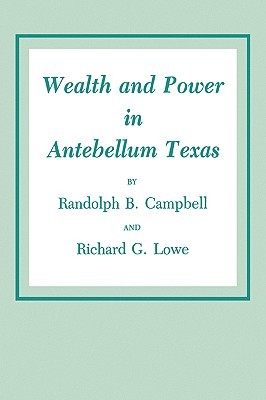
- We will send in 10–14 business days.
- Author: Randolph B Campbell
- Publisher: Texas A&M University Press
- ISBN-10: 1585440892
- ISBN-13: 9781585440894
- Format: 15.3 x 23.4 x 1.4 cm, softcover
- Language: English
- SAVE -10% with code: EXTRA
Reviews
Description
Americans have long lived with an optimistic view of their society, what might be termed the "egalitarian idea." The antebellum South, with its peculiar institution of Negro slavery, has stood in general as the most likely exception to this ideal, though the "planter vs. plain folk" debate has engaged generations of scholars. How closely did the South approximate the "egalitarian ideal"? And how did the South compare with the rest of the nation in terms of economic and political arrangements?
Wealth and Power in Antebellum Texas investigates these questions for a relatively young and rapidly developing part of the slave South. Relying on quantitative evidence gathered from census records as well as on traditional historical materials, the authors examine all measures of the "egalitarian ideal" in the Lone Star state. Their close analysis of wealthholding, the interplay of economic and political relationships, and the direction and degree of change from 1850 to 1860 reveals a high and stable level of inequality in the distribution of wealth, a high concentration of wealthholding in Texas towns, and clear indication that those who held the greatest share of wealth also held the balance of political power. Where possible, comparisons have been made with other areas of the United States. Surprisingly, wealth in Texas before the Civil War was no more unequally distributed than it was elsewhere in the country, both North and South, during the same period. The "egalitarian ideal" may have been largely mythical in antebellum Texas, but it seems to have been equally mythical in the nation as a whole.EXTRA 10 % discount with code: EXTRA
The promotion ends in 18d.04:14:02
The discount code is valid when purchasing from 10 €. Discounts do not stack.
- Author: Randolph B Campbell
- Publisher: Texas A&M University Press
- ISBN-10: 1585440892
- ISBN-13: 9781585440894
- Format: 15.3 x 23.4 x 1.4 cm, softcover
- Language: English English
Americans have long lived with an optimistic view of their society, what might be termed the "egalitarian idea." The antebellum South, with its peculiar institution of Negro slavery, has stood in general as the most likely exception to this ideal, though the "planter vs. plain folk" debate has engaged generations of scholars. How closely did the South approximate the "egalitarian ideal"? And how did the South compare with the rest of the nation in terms of economic and political arrangements?
Wealth and Power in Antebellum Texas investigates these questions for a relatively young and rapidly developing part of the slave South. Relying on quantitative evidence gathered from census records as well as on traditional historical materials, the authors examine all measures of the "egalitarian ideal" in the Lone Star state. Their close analysis of wealthholding, the interplay of economic and political relationships, and the direction and degree of change from 1850 to 1860 reveals a high and stable level of inequality in the distribution of wealth, a high concentration of wealthholding in Texas towns, and clear indication that those who held the greatest share of wealth also held the balance of political power. Where possible, comparisons have been made with other areas of the United States. Surprisingly, wealth in Texas before the Civil War was no more unequally distributed than it was elsewhere in the country, both North and South, during the same period. The "egalitarian ideal" may have been largely mythical in antebellum Texas, but it seems to have been equally mythical in the nation as a whole.

Reviews